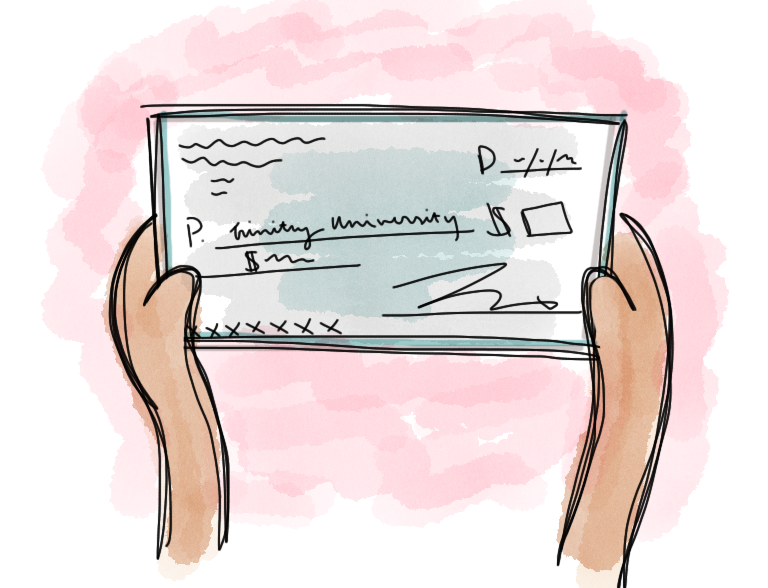Illustration by Genevieve Humphreys
Written by Kathleen Creedon and Dominic Anthony
This article is a part of the Trinitonian’s coverage of Trinity University’s response to the novel coronavirus (COVID-19). Click here to read the rest of our coverage.
This semester, 316 students held federal work-study (FWS) jobs and 496 students held institutional work-study (IWS) jobs, with possible overlap between the two. However, now that the university is functioning remotely, it’s asking that its student workers do the same.
Both on- and off-campus students are now barred from academic buildings and other facilities, like the Bell Center and library. The 28 students who were granted exemptions and will stay in the residence halls this semester have access to their rooms, limited dining options and laundry facilities only, according to Tess Coody-Anders, vice president for Strategic Communications and Marketing.
The notice came after dorms closed and professors prepared to move classes online. Eric Maloof, vice president for Enrollment Management, mentioned the change in the university’s livestream Q&A last week. Shortly after, Maloof emailed students with more information.
FEDERAL WORK STUDY
“For everyone’s health and safety, on-campus work is not an option,” Maloof wrote, regarding institutional work-study. “However, students may be provided the flexibility to continue to work remotely.”
According to the university’s COVID-19 website, the U.S. Department of Education will allow the university to pay students who are federal work study-eligible a lump sum payment on April 9. The lump sum will be students’ estimated wages for the remainder of the semester based on hours worked per week prior to spring break.
“These wages play a critical role for meeting students’ educational expenses, which include materials and living and transportation costs,” the site reads.
The university has already exhausted its federal work-study (FWS) dollars, according to Maloof. He said a large portion of the money paid to FWS students will be institutional money.
INSTITUTIONAL WORK STUDY
Institutional workers are granted no lump sum, but all student workers may continue working from home, if possible. In a letter to the community, university president Danny Anderson addressed the possibility of students working remotely:
“Student workers should communicate with their supervisors to determine the feasibility of continuing their work remotely, as student workers should not come to campus or report to their jobs in person,” Anderson’s letter reads.
Maloof added that if working remotely is not feasible for a student’s institutional work-study position, their most recent paycheck will be their final paycheck for the spring 2020 semester.
THE STUDENTS
As the majority of full-time university staff are expected to work from home, students who acted as receptionists for most academic departments are now out of a job.
Tour guides — who earn a relatively high $15 hourly wage — have no way to continue working. All tours for prospective students have been canceled as of March 16.
The decision also means KRTU student interns won’t be allowed in the station studios. Those interns produce underwriting spots and hourly event calendars. They also host about two dozen hours of programming. Their paid hours have been cut in half if they choose to continue working from home. All volunteer community hosts have been barred from campus.
TigerTV is off-air for the rest of the semester. The library and mail center have cut back hours and shed student workers. The Bell Center is closed and so no longer requires student workers at the moment. And all other student workers — Coates Student Center staff, Diversity and Inclusion Office peer educators, etc. — are asked to communicate with their supervisors about working remotely.
(The Trinitonian will continue publishing to our website throughout the semester, and both the editorial and advertising staff will continue working for pay from a distance.)
Despite this change, all students can apply for funding from the university. The student emergency fund is not loan-based, and nothing must be paid back.







